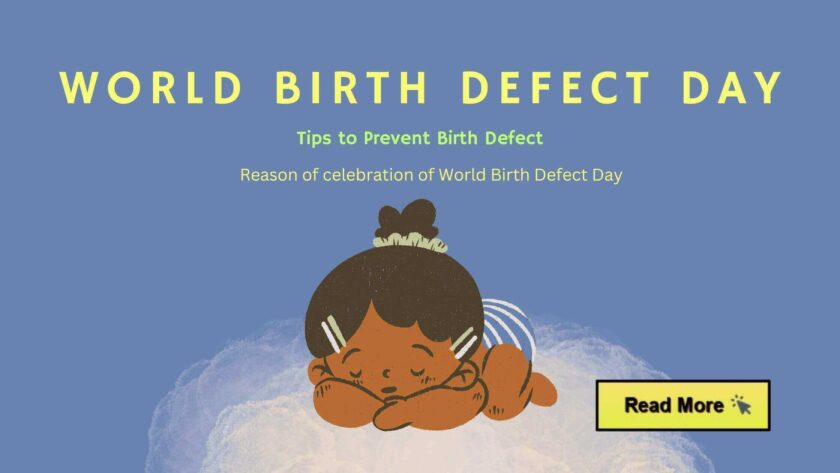World Birth Defect Day is observed on March 3rd every year to raise awareness about the prevention, causes, and treatment of birth defects. It was first observed in 2015 as a global initiative by several international organizations, including the International Clearinghouse for Birth Defects Surveillance and Research, the March of Dimes, and the World Health Organization. An estimated 3,03,000 newborns die every year, worldwide, due to birth defects – out of which an estimated 90,000 deaths occur in South-East Asia.
Why we Celebrate World Birth Defect Day?
The purpose of this day is to draw attention to the significant impact that birth defects can have on the lives of individuals, families, and communities worldwide. Birth defects are structural or functional abnormalities that occur during fetal development, and they can affect various parts of the body, including the heart, brain, limbs, and eyes. Birth defects are a leading cause of infant mortality and can cause lifelong disabilities and health problems.
World Birth Defect Day aims to promote prevention strategies, including prenatal care, genetic counseling, and folic acid supplementation, and to increase awareness of the need for research, diagnosis, and treatment of birth defects. The day also serves as an opportunity to support individuals and families affected by birth defects and to advocate for their access to medical care, education, and social services.
On this day, various organizations and individuals participate in events and activities to raise awareness about birth defects, share information about prevention and treatment, and show support for those affected. The day is marked by the symbol of a butterfly, which represents the beauty and fragility of life, and the importance of protecting and promoting the health and well-being of all individuals.
Tips to Prevent Birth Defect
World Birth Defect Day is observed on March 3rd to raise awareness about the prevention, causes, and treatment of birth defects. While not all birth defects can be prevented, there are steps that expecting parents can take to reduce the risk of having a baby with a birth defect. Here are some tips to prevent birth defects:
- Get early and regular prenatal care: Prenatal care is crucial to ensure a healthy pregnancy and reduce the risk of birth defects. It’s important to see a healthcare provider as soon as you think you’re pregnant and to attend regular check-ups throughout pregnancy.
- Eat a healthy diet: A well-balanced and healthy diet can help reduce the risk of birth defects. It’s important to eat a variety of fruits, vegetables, whole grains, lean protein, and low-fat dairy products. Additionally, it’s recommended to take prenatal vitamins, including folic acid, before and during pregnancy.
- Avoid harmful substances: Avoiding harmful substances such as alcohol, tobacco, and illicit drugs during pregnancy can help reduce the risk of birth defects. Exposure to environmental toxins, such as lead and mercury, should also be minimized.
- Manage pre-existing conditions: Women with pre-existing conditions, such as diabetes or epilepsy, should work with their healthcare provider to manage these conditions before and during pregnancy.
- Stay safe: Accidents, falls, and injuries during pregnancy can increase the risk of birth defects. It’s important to take necessary precautions to stay safe, such as wearing a seatbelt, avoiding high-risk activities, and using protective gear.
By following these tips, parents can take steps to reduce the risk of birth defects and ensure a healthy pregnancy. It’s important to consult with a healthcare provider for individualized recommendations and care.
What should be the healthy diet for Indian Pregnant women?
A healthy diet is crucial for pregnant women to support fetal growth and development and to ensure good maternal health. Here are some general guidelines for a healthy diet for Indian pregnant women.
- Whole grains: Include whole grains, such as brown rice, quinoa, and whole-wheat bread, in your diet. These foods provide fiber and nutrients such as iron, folate, and B vitamins.
- Protein: Protein-rich foods, such as lentils, beans, nuts, and lean meats, are essential for fetal growth and development. They also help to maintain maternal health.
- Dairy: Dairy products, such as milk, yogurt, and cheese, are good sources of calcium, which is important for fetal bone development.
- Fruits and vegetables: Fruits and vegetables provide essential vitamins and minerals, as well as fiber. Aim for a variety of colors to ensure a range of nutrients.
- Healthy fats: Healthy fats, such as those found in nuts, seeds, and fatty fish, are important for fetal brain development. Use oils, such as olive oil, for cooking and dressings.
- Iron-rich foods: Iron is important for fetal growth and maternal health. Include iron-rich foods, such as spinach, tofu, and lean red meat, in your diet. Pair them with foods high in vitamin C, such as citrus fruits, to enhance iron absorption.
- Folic acid: Folic acid is important for fetal development and can help prevent birth defects. Include foods high in folic acid, such as green leafy vegetables, legumes, and fortified grains.
It’s also important to stay hydrated by drinking plenty of water, and to limit or avoid caffeine and alcohol. It’s recommended to work with a healthcare provider or a registered dietitian to develop an individualized nutrition plan that meets your specific needs and preferences.



